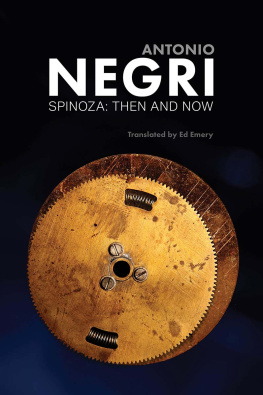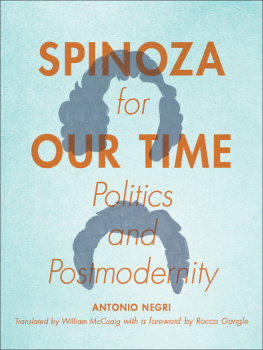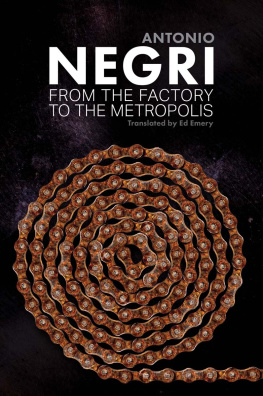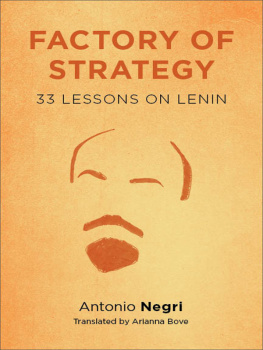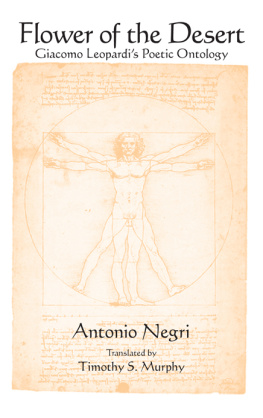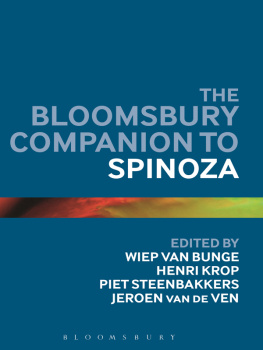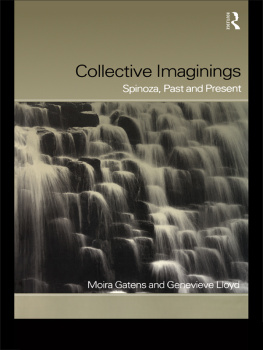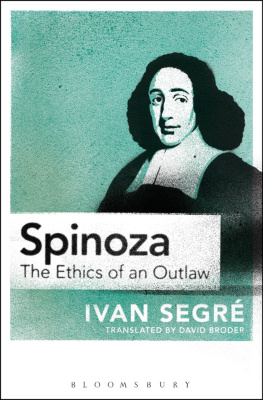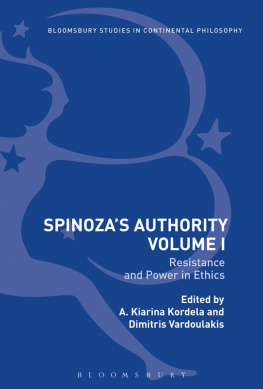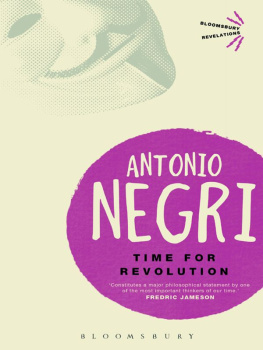
Spinoza: Then and Now
Essays Volume 3
Antonio Negri
Translated by Ed Emery
polity
Copyright Antonio Negri 2017
The right of Antonio Negri to be identified as the Author of this Work has been asserted in accordance with the UK copyright, Designs and Patents Act 1988.
This English edition Polity Press, 2020
Polity Press
65 Bridge Street
Cambridge CB2 1UR, UK
Polity Press
101 Station Landing
Suite 300
Medford, MA 02155, USA
All rights reserved. Except for the quotation of short passages for the purpose of criticism and review, no part of this publication may be reproduced, stored in a retrieval system or transmitted, in any form or by any means, electronic, mechanical, photocopying, recording or otherwise, without the prior permission of the publisher.
ISBN-13: 978-1-5095-0354-4
A catalogue record for this book is available from the British Library.
Library of Congress Cataloging-in-Publication Data
Names: Negri, Antonio, 1933- author.
Title: Spinoza : then and now / Antonio Negri.
Description: Cambridge, UK ; Medford, MA : Polity, [2019] | Series: Essays ; volume 3 | Summary: In this book, renowned theorist Antonio Negri examines how Spinozas thought constitutes a radical break with past ideas and a key tool for envisaging a form of politics beyond capitalism. His philosophy gives us new ways of looking critically at our present, revealing that power must always be seen as a question of antagonism and class struggle-- Provided by publisher.
Identifiers: LCCN 2019011789 (print) | LCCN 2019980272 (ebook) | ISBN 9781509503506 (hardback) | ISBN 9781509503513 (paperback) | ISBN 9781509503544 (epub)
Subjects: LCSH: Spinoza, Benedictus de, 1632-1677. | Spinoza, Benedictus de, 1632-1677--Political and social views. | Power (Philosophy)
Classification: LCC B3999.P68 N4445 2019 (print) | LCC B3999.P68 (ebook) | DDC 199/.492--dc23
LC record available at https://lccn.loc.gov/2019011789
LC ebook record available at https://lccn.loc.gov/2019980272
The publisher has used its best endeavours to ensure that the URLs for external websites referred to in this book are correct and active at the time of going to press. However, the publisher has no responsibility for the websites and can make no guarantee that a site will remain live or that the content is or will remain appropriate.
Every effort has been made to trace all copyright holders, but if any have been overlooked the publisher will be pleased to include any necessary credits in any subsequent reprint or edition.
For further information on Polity, visit our website: politybooks.com
Authors preface
Two histories for Spinoza
This is my fourth book of writings devoted to Baruch Spinoza (163277). The previous volumes were Lanomalia selvaggia (originally published in 1981; see Negri 2006a), Spinoza sovversivo (1992), and Spinoza et nous (2010). This is a body of work that, in a nutshell, seeks to relate Spinoza to two historical episodes: the period around 1968 (and up to the present), when the recovery of Spinozas thought made it possible to re-establish the idea of democracy and the common; and a second history, that of Spinoza in the seventeenth century, where the Spinozist break with the liberal political paradigm immediately became a sign of freedom and indicated a path towards constructing democratic order in the modern period a path that differed from the bourgeois and capitalist path.
In Part 1 I bring together three essays in which, through a critical reading of a number of authors, I suggest that we might see 68 as a good moment, propitious to the operation conducted by a number of joyous Spinozans, thanks to Spinozas thought of affirming democratic thought and of encouraging struggles open to the desire for happiness. The studies by Matheron, Deleuze and Gueroult, followed shortly by those of Macherey, Balibar and Moreau as well as by my own, were fundamental to that moment. This is true in particular of Matherons work, which opens three new strands in Spinozist research: one of time, duration and eternity; another of potenza [power] and action; and yet another of the relationship between the body and the mind (as suggested by Chantal Jacquet). It would be possible to produce an extensive commentary on each of these themes and to follow their development by Matheron and his students. But here I need only emphasise how materialism, seen through the epistemological and ontological lens of Spinozism, was able to abandon its traditional foundation in dialectic and to embark on a project that was simultaneously constitutive and subjective. Thus Spinozism corresponds to a call for insurrection and to the new figure of class struggle that, from 1968 on, was no longer willing to squeeze through metaphysical straits towards teleological destinations.
It is interesting that Matherons analysis achieves these political objectives through extreme philological rigour. It is not by chance that Matheron is mentioned as a student of Gueroults, a distinguished example of philological prowess. But he was nobodys pupil: his philology has an autonomous soul and renders political the bifurcation that Spinoza introduced into modern philosophy. This same bifurcation was also present in the philosophy of 1968, where Spinozism was reborn in opposition to Heideggerism, implementing political realism in the face of the mysticism that had been the end point of the metaphysics of modernism and of Schmittian cynicism in political thought. Here I wish to stress the importance of the rediscovery of Spinoza in the 1960s and 1970s: in the exit from traditional Marxism, it was Spinozism that rejected all the variants, strong or soft, of Krisis thinking. Instead of celebrating, with a modicum of angst, the need to return to order and to submit to the crude exercise of the economic weapons of capitalism, instead of accepting a conception of being in which the memory of a time of struggle could be erased, one could begin to reconstruct a revolutionary perspective on the terrain of Spinozism, because as Matheron and his pupils taught being is a dispositif for the destruction of sadness, desire is a dispositif of collective construction of freedom and joy, and absolute democracy (in other words, the democracy of struggles) is the only conceivable form of freedom and equality.
Thus I have outlined the general horizon in which my work on Spinoza took shape. In the first part of the present collection I retrace the elements of this general perspective, examining in particular the relationship between Spinoza and Deleuze. I emphasise that this relationship was fundamental in creating the fabric on which Deleuze and Guattari enacted (between Anti-Oedipus and A Thousand Plateaus) the critique of contemporaneous capitalism; in their reading of Spinoza we find a verification of his rupture with the historical and philosophical tradition. On the one hand, the Deleuzian reading had the merit of asserting the potenza of singularities against the ethics of individualism and against the totalitarianism of commodities consubstantial with bourgeois culture. This is what the spirit of May 1968 (and of the following years) sought to abolish, and the work of Deleuze and Guattari represented a weapon to that end. On the other hand, in the context of the new readings made at the time, the malicious definition of Spinozas ontology contrived by Hegel and designed to normalise the subversive power of Spinozas work was set aside. Spinozas world was supposedly acosmic, and characterised by temporal immobility. Actually Spinoza seems to ignore the word time: the fact is that he transforms the traditional metaphysical definition, according to which time is a measure. He opts for time-life [
Next page
